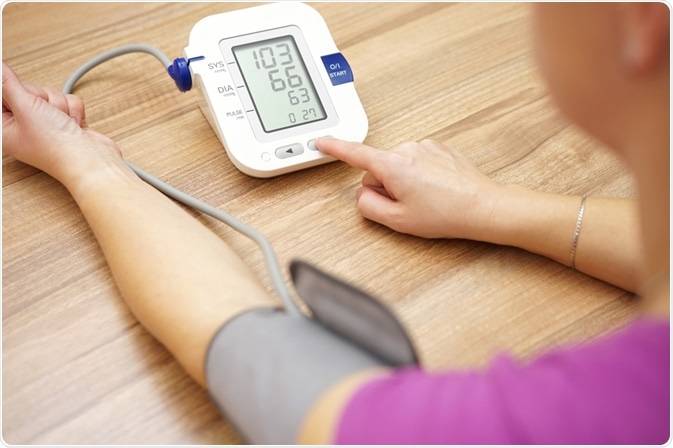Hypotension or low blood pressure prevents organs from receiving the necessary amount of blood to function. An acute reduction in blood pressure can result in shock syndrome, whereas long-term hypotension can lead to lethargy, fatigue, weakness, dizziness, fainting, and other symptoms.

Image Credit: Bacho / Shutterstock.com
Since arterial pressure is determined by cardiac output, venous pressure, and systemic vascular resistance, a reduction in any of these variables can result in hypotension. Thus, low blood pressure may be a result of reduced cardiac output, blood volume redistribution, hypovolemia, reduced systemic vascular resistance, and/or vascular obstruction.
Hypotension due to a reduced cardiac output
Cardiac output, which can be defined as the amount of blood pumped from the heart, can be reduced as a result of three main conditions including arrhythmias, structural disease of the heart, or hypovolemia. Older patients are particularly at risk of hypotension, as the aging process further reduces the compliance of the heart's ventricles and subsequently lessens its contractility.
Bradycardia, or slow heart rhythm, caused by a low sinus rate or atrioventricular block reduces cardiac output. On the other hand, tachycardia can also result in reduced cardiac output by decreasing ventricular filling time with a subsequent large reduction in stroke volume. Ventricular fibrillation leads to profound hypotension by plummeting cardiac output down to zero.
Structural disease of the heart such as cardiomyopathies can impede both systolic functions, which is the muscle contraction of the heart, as well as diastolic function, which represents the ventricular filling. As a result, these diseases can reduce both cardiac output and arterial pressure. Pericardial disease, valve disease, and congenital defects can also compromise ventricular filling or net forward flow with the same consequence.
Ischemic heart disease caused by atherosclerosis or thromboembolism also has a negative effect on ventricular function and often results in exercise-induced hypotension. Primary pulmonary hypertension, which is an abnormally high blood pressure within the arteries of the lungs, can lead to right ventricular failure and, in turn, impaired left ventricular filling and output.
Hypovolemia, which is typically the result of hemorrhage, and orthostatic volume changes can also reduce cardiac output by decreasing central venous pressure and ventricular filling, both of which impair the pumping ability of the heart. Excessive water loss, or dehydration, caused by profuse sweating, restricted water intake, or use of diuretic drugs, can also lead to a hypovolemic state.
Hypotension of vascular origin
Hypotension may also be of vascular origin. In these situations, hypotension is generally caused by excessive systemic vasodilation, which is a reduction in systemic vascular resistance. This condition can be a result of anaphylaxis, sepsis, autonomic nerve dysfunction such as diabetic neuropathy, neurogenic shock, which can occur during a spinal cord injury, for example, or after administration of various types of vasodilatative drugs.
A second vascular cause of hypotension is an obstruction (e.g. pulmonary embolism) that diminishes venous return to the left ventricle, thereby decreasing its output. Thrombolytic therapy should be used in such patients; however, the patient's bleeding risk should be adequately assessed.
Vascular endothelial growth factor (VEGF) induces hypotension in normotensive subjects due to endothelium-dependent vasorelaxation, which is considered to be a major side effect for the treatment of ischemic diseases. In addition, hypotension after successful angioplasty with stenting can be a lethal complication.
References
Further Reading
Last Updated: Mar 18, 2021